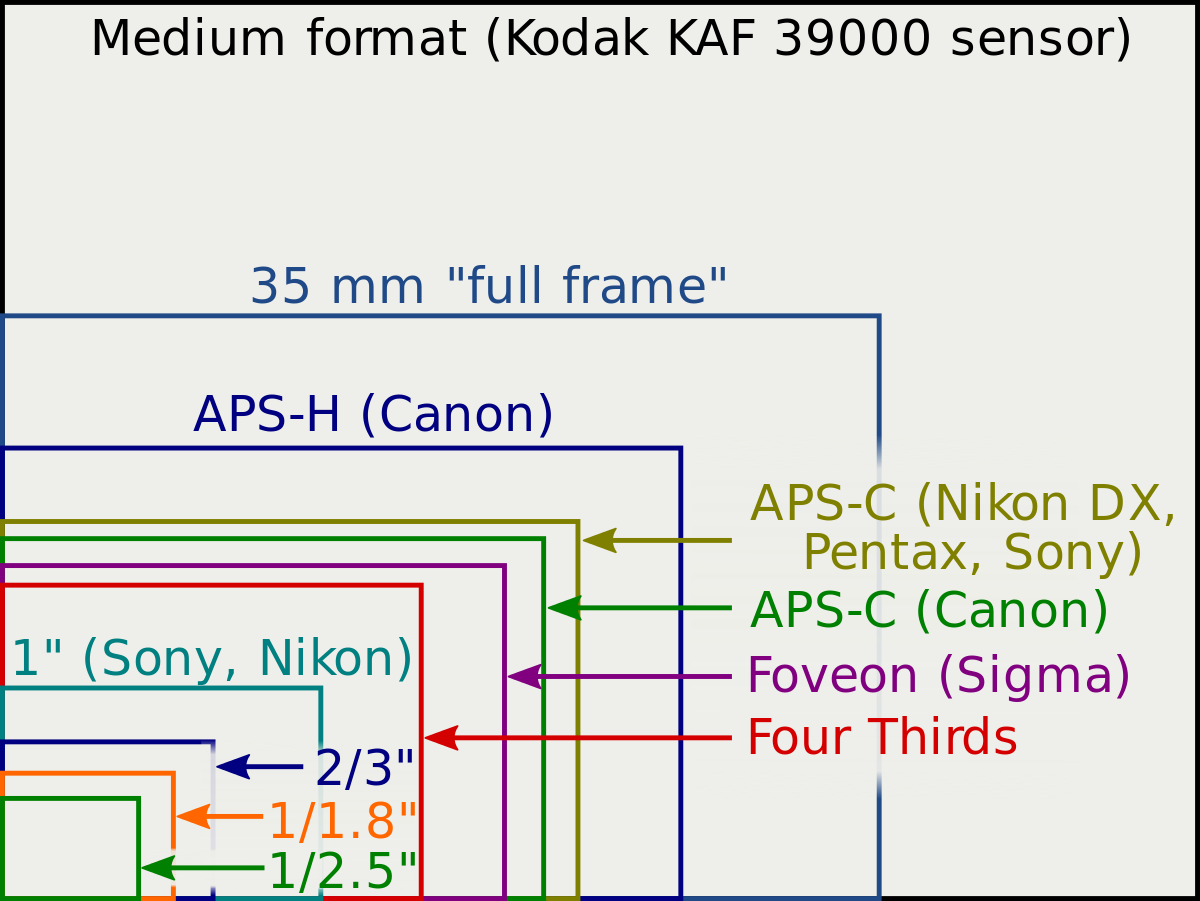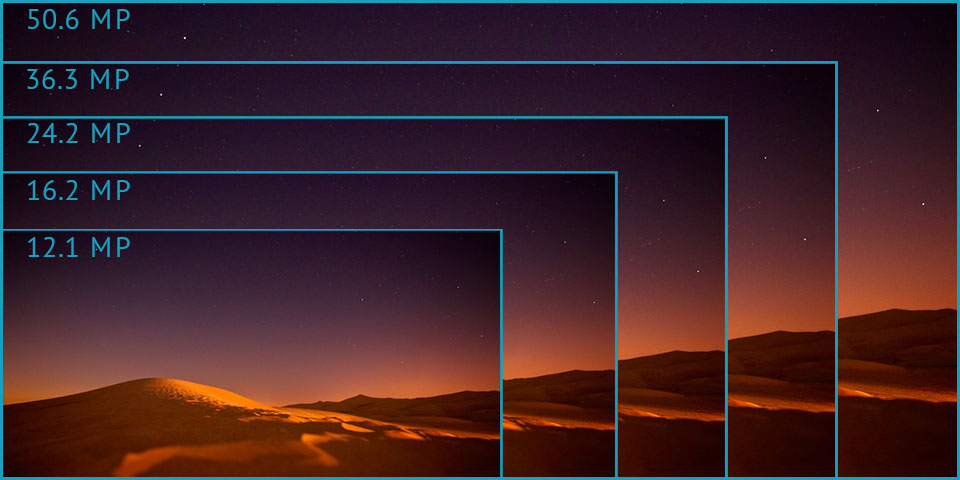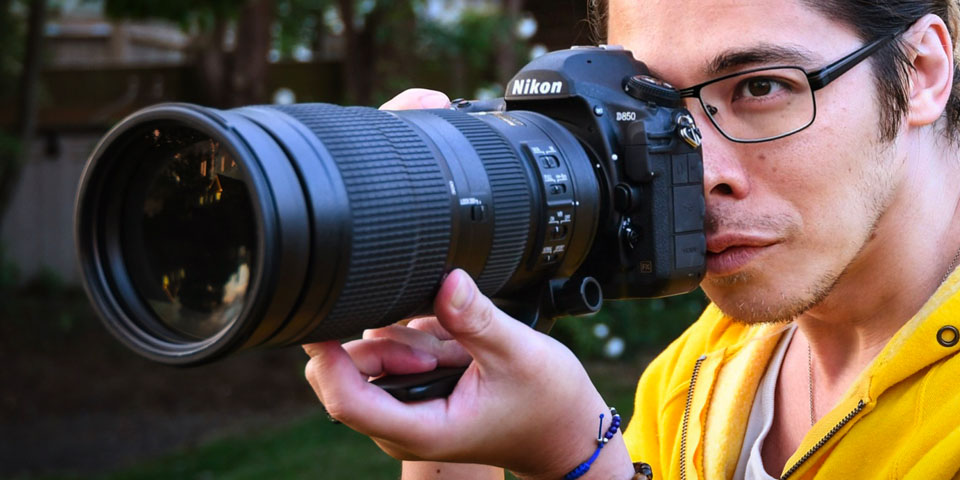The highest megapixel cameras for portrait, landscape, or commercial photos.
Whether you're a professional photographer or simply an enthusiastic hobbyist, having the highest megapixel camera is a game-changer. It allows you to capture breathtaking, razor-sharp photos and videos, while providing a plethora of features to meet your creative needs.
Just imagine the possibilities with a 61MP back-illuminated CMOS sensor, delivering outstanding imaging performance. And let's not forget its wide dynamic range and support for HDR images.
If you see the title “highest resolution cameras,” this does not mean that it will consist of medium format cameras that cost a lot. Of course, professionals need a high-resolution camera for photo shootings in the studio to print photos on billboards magazines or ads.
But amateurs, travelers, and even newbies want to get the best resolution possible with their budget too. Therefore, you will see both DSLR cameras for about $2000 and a huge medium-format devices for more than $5,000 in the list carefully chosen by FixThePhoto team.
Type: Mirrorless | Megapixels: 61.2MP | Screen: LCD | Max continuous shooting speed: 10fps
First off, this Sony camera is truly remarkable when it comes to capturing extraordinary images. With its high-density image sensor, it can extend the resolution up to a whopping 240 MP without losing any details.
Another advantage is the improved in-body image stabilization, which maximizes the performance of those high-resolution megapixels. This means you can expect sharp and clear images even in challenging shooting conditions.
The camera also features a large, tilting touchscreen LCD, making it easy to navigate through menus and review your shots. And with dual UHS-II SD card slots, you have plenty of storage space for all your captures.
Overall, the Sony Alpha 7R IV is a fantastic camera with most megapixels for photographers who need the highest resolution and have the budget to match. It's great for landscape, wildlife, and portrait photography, thanks to its exceptional detail and low-light performance.
Type: Mirrorless | Megapixels: 102MP | Screen: LCD | Max continuous shooting speed: 5fps
If you are a landscape or studio photographer, this highest resolution camera system stands out for its exceptional image quality. With its larger-than-full-frame image sensor, 16-bit raw files, and superior low light performance, the GFX100 truly excels in capturing stunning details in both shadows and highlights.
The tonal transitions are incredibly smooth, allowing you to produce highly detailed high-resolution prints without sacrificing any details in the mid-tones or highlights. Additionally, the camera's ability to create beautiful monochrome images is a definite plus.
The camera comes equipped with Fujifilm's beloved film simulation modes, including the unique Monochrome mode that adds a classic black-and-white touch to your images.
One of the main drawbacks is its size and weight, which can limit its handheld usage for extended periods. This Fujiflm camera is best suited for controlled environments or when used with heavy-duty tripods. Another issue is that it does not support CFexpress cards, which could provide faster write speeds.
Type: Mirrorless | Megapixels: 45MP | Screen: LCD | Max continuous shooting speed: 20fps
Type: DSLR | Megapixels: 45.7MP | Screen: LCD | Max continuous shooting speed: 9fps
The D850 boasts an astonishingly high resolution, putting many highest resolution digital cameras to shame. With its sensor, you can create large prints and crops without losing any detail. This gives you great flexibility in post-processing and allows you to use the camera in various shooting situations.
The dynamic range on this Nikon photography cameras is also incredible, thanks to its BSI sensor. It can handle high-resolution images even at higher ISO settings, making it ideal for low-light. Plus, it can even record cinematic 4K UHD video, which is a nice bonus.
Another standout feature of the D850 is its speed. It can shoot up to 9 frames per second, making it perfect for capturing fast-paced action or sports events. The camera uses a new image processing engine and a pixel shift technique to achieve this level of performance.
One issue some users have experienced is with the autofocus system, which can be a bit slow and inaccurate at times. While this may not be a deal-breaker for everyone, it's definitely something to consider if you rely heavily on precise focusing.
Type: Compact | Megapixels: 47.3MP | Screen: LCD | Max continuous shooting speed: 20fps
Leica camera brand has paid attention to even the smallest details. For example, the EVF diopter adjustment dial now locks, preventing accidental changes. The battery compartment has also been improved, making it nearly impossible to drop the battery. These little enhancements really add to the overall experience.
The Leica Q2's autofocus system is excellent. It works quickly and accurately, with a short focus acquisition time. Additionally, the camera's high ISO performance is impressive. By removing certain filters, Leica has enabled the camera to capture more light at higher ISO settings, resulting in better dynamic range and detail retention.
Its magnesium-alloy body is dust and water resistant, which is a nice bonus. And with Bluetooth LE and Wi-Fi connectivity, you can control your highest resolution camera remotely and share your photos with ease.
While the Q2 offers a crop mode that allows you to shoot at different focal lengths, the images produced in this mode don't look as good as those taken with the full-frame sensor. There's a noticeable lack of depth of field at close range when using the crop mode.
Type: DSLR | Megapixels: 50.6MP | Screen: LCD | Max continuous shooting speed: 5fps
First and foremost, the standout feature of this highest resolution digital camera is its massive full frame sensor. This resolution is truly impressive, especially for those who print large-scale or enjoy scrutinizing every pixel. Landscape photographers and individuals shooting still subjects with a tripod will particularly appreciate this feature.
However, it's important to note that the high resolution can also amplify any flaws in your lenses, so proper technique and using the best lenses available are crucial.
The camera even appends the dust location data to subsequent images for further automatic dust spot removal during post-processing. This is a useful feature for those who are meticulous about maintaining a clean sensor.
However, it's important to acknowledge the limitations of this full frame camera. While its high resolution is impressive, it demands the use of top-quality lenses to truly maximize its potential. Moreover, its autofocus performance, while generally high-speed, may not match the capabilities of some other cameras in its class.
Type: Mirrorless | Megapixels: 61MP | Screen: LCD | Max continuous shooting speed: 10fps
The FP L boasts an impressive full-frame back-illuminated sensor with phase detection pixels for autofocus. This means you can capture incredibly detailed and sharp images, perfect for printing large photographs.
As one of the best dynamic range cameras, Sigma FP L also offers a wide ISO range of 100-25600, making it suitable for various lighting conditions. Additionally, it has a Crop Zoom mode that allows you to digitally zoom into images without sacrificing resolution, which is great for reframing scenes.
Another advantage of the FP L is its outstanding dynamic range and low noise levels in both shadows and highlights. This means you can capture intricate details and vibrant colors even in challenging lighting situations. The camera's sensor, influenced by Sigma's Foveon technology, ensures that images are free from artifacts and distortions commonly found in other full-frame sensors.
However, the FP L highest resolution digital camera does have some downsides. Firstly, it takes a bit of time to start up, which can be frustrating if you need to capture an image quickly. The autofocus can also be unreliable at times and isn't particularly fast when it comes to tracking moving subjects.
Type: Mirrorless | Megapixels: 45MP | Screen: LCD | Max continuous shooting speed: 12fps
This Canon camera boasts an impressive full-frame sensor. This means it delivers exceptional image quality, allowing you to capture stunningly detailed photos. Whether you're shooting landscapes or portraits, the high resolution of this camera will not disappoint.
Moreover, the camera's high dynamic range allows for capturing more detail in both highlights and shadows. This is particularly useful when dealing with challenging lighting situations.
The Canon EOS R5 highest megapixel camera also offers an impressive range of focusing modes, including automatic tracking and face detection, making it ideal for capturing fast-moving subjects such as sports or wildlife.
Now, let's move on to some of the drawbacks and problems you might encounter when using this camera. One notable issue is the camera's tendency to overheat during long recording sessions. However, Canon has implemented measures to minimize this problem by keeping heat-generating components separate and using energy more efficiently.
Type: Mirrorless | Megapixels: 45.7MP | Screen: LCD | Max continuous shooting speed: 30fps
The image quality of the Z9 is truly outstanding. With its new 45-megapixel stacked backside-illuminated full frame CMOS sensor, it captures stunning detail and produces sharp, vibrant images. The camera's ISO range of 64-25,600 allows for excellent performance in low-light situations.
The Z9 also stands out in terms of video capabilities. This video camera supports the upcoming high-efficiency 8K format, allowing for incredibly high-resolution footage. This is a major advantage for professionals who require top-notch video quality.
In terms of speed, the Z9 highest resolution digital camera does not disappoint. Powered by the EXPEED 7 processor, it boasts impressive focus speed and low-light performance. Its hybrid phase-detect autofocus system with 493 AF tracking points is a significant improvement over previous models, making it easier to track moving subjects.
One notable drawback is its price tag, which is higher than its competitors from Canon and Sony. This may make it less accessible for some photographers on a budget.
Type: Mirrorless | Megapixels: 40.2MP | Screen: LCD | Max continuous shooting speed: 15fps
Starting with the advantages, the X-H2 truly lives up to Fujifilm's reputation for making excellent mirrorless cameras. It's designed for photographers who prioritize image quality over speed, but it can still handle high-speed action if needed.
In terms of image quality, the X-H2 boasts a new 40MP X-Trans CMOS 5 HR sensor, providing the highest resolution in the X Series lineup. It also includes some useful features for photographers. The automatic white balance system has been improved, using deep learning to recognize specific lighting conditions and adjust the color temperature and tint accordingly.
There's also a Smooth Skin Effect that enhances facial skin tone, reducing the need for extensive post-processing in portrait photography. The camera offers 19 Film Simulation modes, allowing you to capture unique colors and tonality akin to different types of films.
While this highest MP camera excels in image quality, it may not be the best choice for photographers who require fast continuous shooting speeds. Although it can shoot at 15fps with the mechanical shutter and 20fps when cropped into the image, some competing cameras may offer faster speeds.
Type: Mirrorless | Megapixels: 60MP | Screen: LCD | Max continuous shooting speed: 4.5fps
Being one of the most expensive cameras, the Leica M11 is making quite a buzz with its impressive 60-megapixel sensor. It's the highest resolution digital M camera ever produced by Leica, and it boasts their latest Maestro III image processor. The camera is designed to capture images with incredible digital quality, thanks to its full-frame BSI CMOS sensor.
One of the standout features of this camera is its ability to record images at three different resolutions: 60, 36, or 18 megapixels (DNG only). This gives you the flexibility to choose the resolution that suits your specific needs. Leica's "Triple Resolution Technology" allows for downsizing images without sacrificing quality, resulting in increased dynamic range and reduced noise.
In terms of functionality, the M11 highest MP camera offers a range of programmable FN buttons, allowing you to customize the camera to your preferences. The rotary dial provides manual settings, including a wide range of shutter speeds and a Bulb mode for longer exposures. The inclusion of GPS, Wi-Fi, and Bluetooth connectivity is a welcome addition, enabling seamless sharing and remote control capabilities.
While the M11 offers outstanding image quality and performance, it does come with a few challenges. The camera's high resolution and large file sizes can put a strain on its buffer capacity. If you're shooting in very low light or at high frame rates, you may need to decrease the resolution to maintain optimal performance.
Type: Mirrorless | Megapixels: 47.3MP | Screen: LCD | Max continuous shooting speed: 9fps
This Panasonic camera offers incredible image quality, especially when shooting raw files that have been carefully processed. The "High Resolution" mode is a standout feature, allowing you to capture stunning 187MP images using sensor shift technology. This is particularly useful for photographers working with textiles or other moire-prone patterns.
The S1R highest megapixel camera boasts a superb sensor, larger than the popular GH5 and G9 models. This larger sensor gives it an advantage in terms of image quality, especially in low light situations. The camera's microlens and other technical advancements enhance light-gathering efficiency, resulting in detailed images even at higher ISO settings.
One standout feature is the 5-axis Dual IS system, combining lens-based stabilization with in-body image stabilization. This system provides up to 6EV of shutter speed compensation, ensuring sharp images for both stills and video.
Now, let's talk about a few drawbacks. The S1R is on the pricier side, making it less suitable for beginners or those with limited camera experience. Besides, its higher resolution may not be necessary for everyone, especially if they don't require such large image sizes.
| IMAGE | NAME | FEATURES | |
|---|---|---|---|

|
Sony Alpha 7R IV
OUR CHOICE
|
CHECK PRICE → | |

|
Fujifilm GFX100
DURABLE
|
CHECK PRICE → | |

|
Hasselblad X1D II 50C
FOR PROS
|
CHECK PRICE → |
When choosing the best highest resolution camera, consider the size of the matrix, the number of megapixels, and your specific needs. And remember, it's not just about megapixels – the size of the matrix matters too.

Size of the camera's matrix. A larger matrix will provide better image quality and more detail, while a smaller one will produce lower-quality images. So, if you want top-notch picture quality, go for a rangefinder camera with a larger matrix.
You can increase the number of pixels in two ways: by increasing the size of the matrix or, on the contrary, by reducing the area of the pixels themselves, so there will be more of them on the same matrix size. The first way is expensive, while the second is cheaper, as it’s not necessary to increase the matrix itself.
More megapixels are good, of course, but the fact that the area of each sensor decreases at the same time is very bad. Vendors, and sometimes even manufacturers, almost never indicate matrix dimensions in millimeters, using such designations as 1/2.5" or 1/1.8" instead. The point is that the greater the number in the denominator, the smaller the matrix, and many people do not know this.

Matrix resolution. The number of pixel sensors on the matrix affects the resolution (image detail), the size of the future photo and, unfortunately, the level of noise. The more pixels, the sharper the photo.
For example, 4928 points in width and 3264 in height are located on the matrix. Multiplying the width by the height, we get 16,084,992 (approximately 16 million) pixels.
In this case, we can say "the resolution of the camera is 16 megapixels,” or "the resolution of the sensor is 16 megapixels." Many people want to have a camera with most megapixels that will take pictures better than the human eye sees, but not many people know that the equivalent resolution of the eye is 576 megapixels, and a camera that’s equal to the human eye in quality will not be created anytime soon.
Light sensitivity. The light sensitivity of the matrix consists of the light sensitivity of all its photosensor pixels, which, in turn, depends on the size of the pixels. The larger their size, the more light falls on the sensor, and the clearer and more natural colors and less digital noise you’ll get.
In low light, the shutter speed is long, and then, due to the threat of blurring in the image, the light sensitivity is usually increased (referred to as ISO). In film photography, you would change the film for this, but it is simpler with the digital camera – you can just change the ISO settings.

The ISO in the DSLR is usually kept between 100 and 6400–25600, and even higher. Today, these are normal numbers, which are determined by the size and other characteristics of the matrix. You shouldn’t treat high ISO values seriously when choosing a high-resolution camera – only in the “very top” DSLR models. You won’t be able to remove the noise, as the matrix is noisy and will always be noisy.
Specific needs and budget. If you're a professional photographer or someone who values image quality, a higher resolution camera would be ideal. It will give you the freedom to print larger photographs and capture more detail.
But here's the thing: resolution isn't solely determined by megapixels. After all our tests, we are sure the size of the camera's matrix plays a crucial role too. So, if you want to make large prints, opt for a camera with most megapixels with a larger matrix.